You know hydrochloric acid? The stuff you played around with
in chemistry class, and if it was really concentrated you had to be really
careful with it lest it burned your clothes or skin off?
 Well, your stomach
produces it naturally, in large amounts, in order to break down the food you
eat. I think that is pretty amazing.
Well, your stomach
produces it naturally, in large amounts, in order to break down the food you
eat. I think that is pretty amazing.But... surely it can’t be that concentrated, right?
It might interest you to know that the pH of stomach
acid can go down as low as 1.5. Which is fairly powerful:
- with the help of enzymes, it breaks down the food we eat.
- can kill swallowed micro-organisms, including the stuff in our phlegm! Thus forming part of the body's defence system.
- with the help of enzymes, it breaks down the food we eat.
- can kill swallowed micro-organisms, including the stuff in our phlegm! Thus forming part of the body's defence system.
Amazing.
So what stops acid from digesting us from the inside out? The lining of the stomach produces a layer of acid-neutralising mucous.
Incredible.
However there are times when the mucous barrier is overcome; imagine then the damage which can occur. Perhaps you have experienced it, stomach complaints are one of the most common of the minor ailments
which afflict us.
Heart burn (or reflux) and gastritis are two very common ailments caused by
hyperacidity (states of too much acid) in the stomach. (Indigestion is a general term for feelings of discomfort felt in the stomach area associated with eating).
Heartburn (Reflux):
Heartburn (Reflux):
Stomach acid is prevented from coming out the stomach
back up (reflux) into the oesophagus via a valve called a sphincter. If the
sphincter is overcome and reflux occurs, this causes the sensation of a burning discomfort located in the middle of the chest, because the oesophagus is not designed to withstand acid. It can
also irritate further up and manifest as coughing.
Possible causes of sphincter failure - overeating, pregnancy (where the stomach is squeezed). Less commonly, some people for unknown reasons just produce more stomach acid than normal.
Personal experience: Coughing and throat clearing after eating were symptoms I suffered with a lot and for a long time. It would get worse after a prolonged cough caused by a respiratory tract infection, so I always thought it was just due to that, and I did nothing about it because I simply had no idea.
Gastritis:
Inflammation of the stomach. The acid-neutralizing mucous barrier is
overcome and acid manages to irritate the stomach lining.
Personal experience: I initially assumed I had heartburn, because the discomfort I felt was so localized. Then my sister pointed out that it was
possible for the discomfort to be gastritis, as I was basically indicating where my
stomach was. (Note, a lot of people don’t realise how high up their body their stomach is, it is practically up in your chest. Where the bulge of your ‘tummy’ is where the bulk of your intestines lie.) The discomfort at the time was also persistent, although in the past I definitely went through spells of clearing my throat and coughing a lot after
eating which is a definite symptom of reflux. So probably I had both conditions.
Stomach Ulcers:
Although this post is about heartburn and gastritis, stomach ulcers are related. The causes of stomach ulcers may also cause gastritis and heartburn.
Ulcers occur when acid destroys parts of the stomach lining. How can this happen, why do some people get ulcers? Here are the major culprits:
Helicobactor pylori - a bacteria which lives in the stomach. These shield themselves from the acid by hiding out in the mucous layer, and also the stomach lining. This triggers inflammation, which then causes excess acid secretion, and then causes ulcers if not sorted. If the inflammation is very prolonged, then this may lead to stomach cancer.
NSAIDs - Non-steroidal Anti-inflammatory Drugs. These include the pain killers aspirin, ibuprofen (Nurofen), mefenamic acid and diclofenac (Voltaren) to name a few. Although these are valuable in pain management, stomach ulcers are one of their most common side effect, so beware if you take an NSAID on a prolonged, regular basis. They must be taken with food, and if taken often, should be taken with a stomach acid protectant such as a PPI or an H2 antagonist (see below).
Stress - Stress is often linked to causing ulcers, and hyperacidic symptoms such as heartburn and gastritis. Not sure why that is. But it is worth trying to destress to see if this helps. Try yoga, meditation, cutting out caffeine, sleeping 7-8 hours at night, etc.
Drugs which tackle stomach acid:
There are three classes of drugs in this category:
Although this post is about heartburn and gastritis, stomach ulcers are related. The causes of stomach ulcers may also cause gastritis and heartburn.
Ulcers occur when acid destroys parts of the stomach lining. How can this happen, why do some people get ulcers? Here are the major culprits:
Helicobactor pylori - a bacteria which lives in the stomach. These shield themselves from the acid by hiding out in the mucous layer, and also the stomach lining. This triggers inflammation, which then causes excess acid secretion, and then causes ulcers if not sorted. If the inflammation is very prolonged, then this may lead to stomach cancer.
NSAIDs - Non-steroidal Anti-inflammatory Drugs. These include the pain killers aspirin, ibuprofen (Nurofen), mefenamic acid and diclofenac (Voltaren) to name a few. Although these are valuable in pain management, stomach ulcers are one of their most common side effect, so beware if you take an NSAID on a prolonged, regular basis. They must be taken with food, and if taken often, should be taken with a stomach acid protectant such as a PPI or an H2 antagonist (see below).
Stress - Stress is often linked to causing ulcers, and hyperacidic symptoms such as heartburn and gastritis. Not sure why that is. But it is worth trying to destress to see if this helps. Try yoga, meditation, cutting out caffeine, sleeping 7-8 hours at night, etc.
Drugs which tackle stomach acid:
There are three classes of drugs in this category:
Antacids:
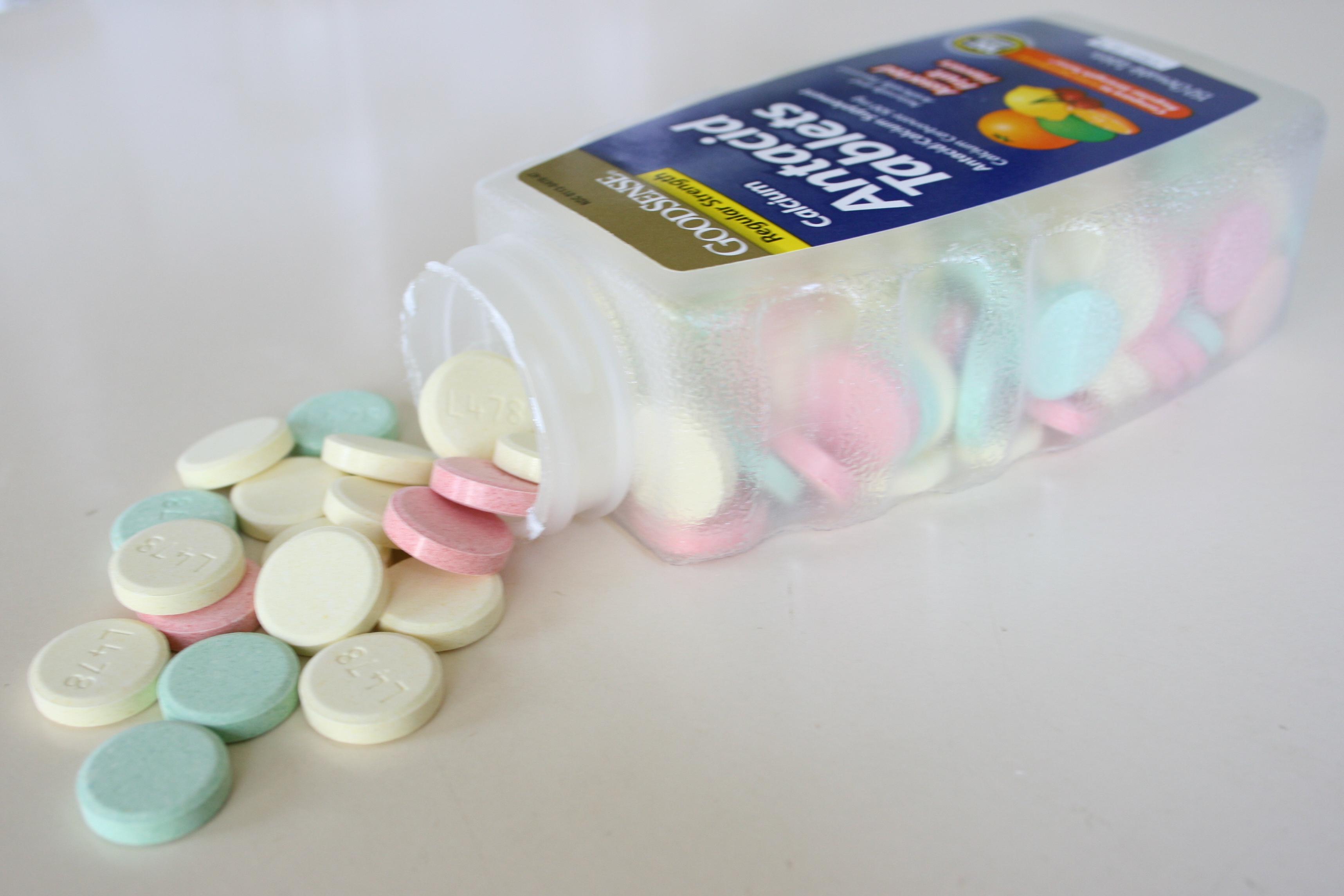 Literally, these are bases which react with acid and neutralize it. They are chalky type tablets or liquids. Products such as
Rennies and Tums. Sodium Bicarbonate (Bicarbonate of soda) is a traditional one, which can be found in Gaviscon and Alka-Seltzer.
Literally, these are bases which react with acid and neutralize it. They are chalky type tablets or liquids. Products such as
Rennies and Tums. Sodium Bicarbonate (Bicarbonate of soda) is a traditional one, which can be found in Gaviscon and Alka-Seltzer.
These are safe, providing you don’t over do them - for example sodium bicarbonate contains sodium, something to think about especially if you don’t want too much salt in your diet.
I don't recommend Alka-Seltzer, as it contains aspirin (NSAID, see above), which can irritate the stomach and contradicts its use for hangover management.
 Literally, these are bases which react with acid and neutralize it. They are chalky type tablets or liquids. Products such as
Rennies and Tums. Sodium Bicarbonate (Bicarbonate of soda) is a traditional one, which can be found in Gaviscon and Alka-Seltzer.
Literally, these are bases which react with acid and neutralize it. They are chalky type tablets or liquids. Products such as
Rennies and Tums. Sodium Bicarbonate (Bicarbonate of soda) is a traditional one, which can be found in Gaviscon and Alka-Seltzer.These are safe, providing you don’t over do them - for example sodium bicarbonate contains sodium, something to think about especially if you don’t want too much salt in your diet.
I don't recommend Alka-Seltzer, as it contains aspirin (NSAID, see above), which can irritate the stomach and contradicts its use for hangover management.
 Often you will see antacid preparations containing Aluminium and Magnesium Hydroxide. In case you're wondering why - magnesium
causes diarrhoea and aluminium
causes constipation, so putting them together should cancel out any bowel related side-effects.
Often you will see antacid preparations containing Aluminium and Magnesium Hydroxide. In case you're wondering why - magnesium
causes diarrhoea and aluminium
causes constipation, so putting them together should cancel out any bowel related side-effects.
Gaviscon also contains alginate, this is a gel type
substance obtained from sea algae. This forms a gel-foam barrier on the top of the
stomach acid to hold acid down, and is good for reflux.
Antacids are good first line drugs to try out. But don’t take
these for weeks on end without checking it out with a
doctor first. H2 antags and PPIs are stronger, and may be worth trying in this case as well.
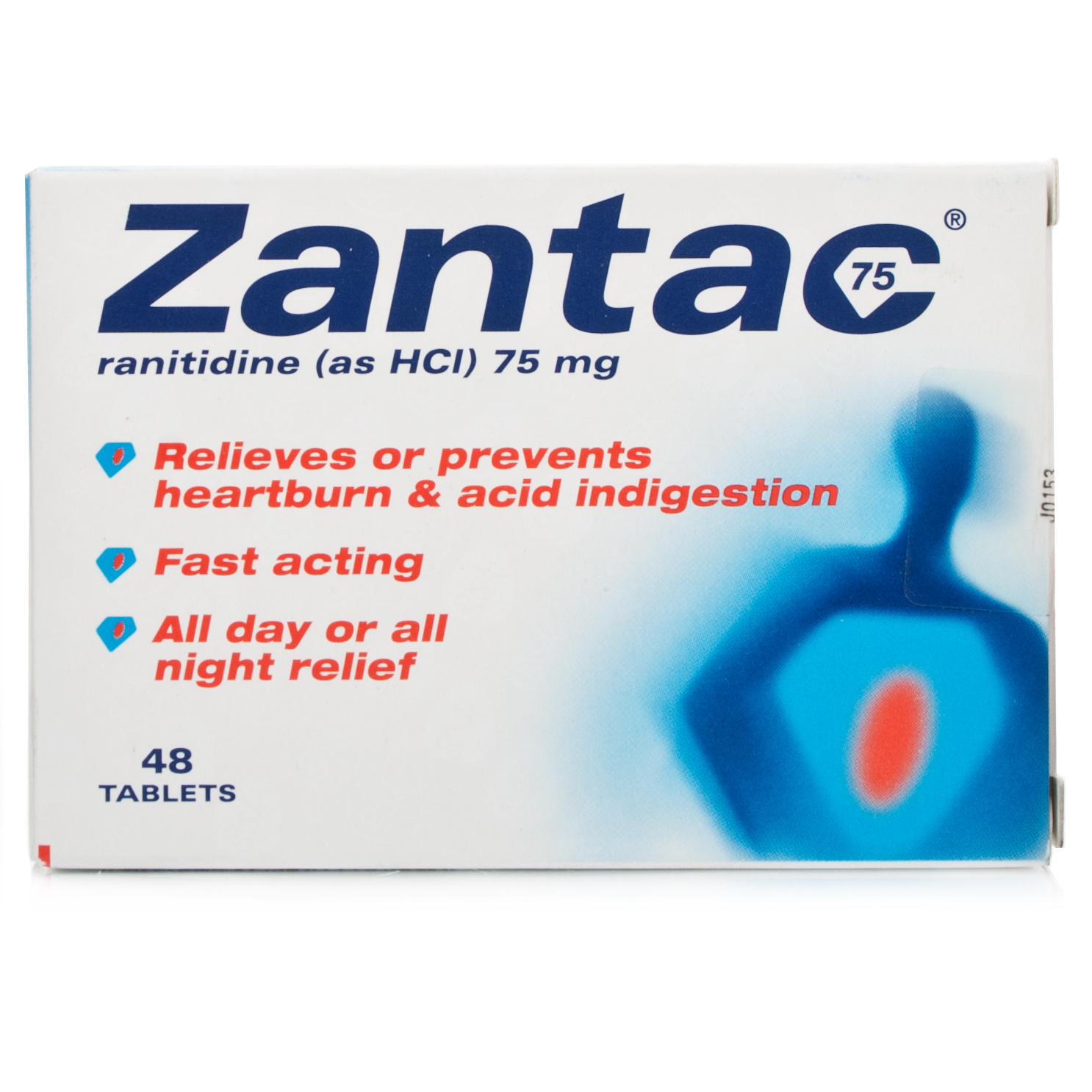
H2 antagonists:

H2 antagonists:
These include Ranitidine (Zantac), famotidine (Pepcid) and
cimetidine (Tagamet) - mostly drugs which end with -idine. These reduce the secretion of acid in the
stomach, and are stronger than antacids.
These are available from the pharmacy, more pricey than antacids but worth trying to see if they help.
Proton pump inhibitors (PPIs):
 Includes omeprazole (Losec), lansoprazole, pantoprazole, esomeprazole. These are considered to be
‘stronger’ still than H2 antags, and also suppress acid secretion. These are
also available from pharmacies, typically in smaller packets and at more
expensive prices.
Includes omeprazole (Losec), lansoprazole, pantoprazole, esomeprazole. These are considered to be
‘stronger’ still than H2 antags, and also suppress acid secretion. These are
also available from pharmacies, typically in smaller packets and at more
expensive prices.
You can combine drugs from different classes, for example
you could take an antacid with a proton pump inhibitor. Take them at different
times however, as antacids can reduce the effectiveness of PPIs. Also, if your
stomach is bothering you so much that you are having to take combinations of
these drugs, you really should get a doctor to check you out.
Digestive aids which contain enzymes
 Digestive enzymes (amylase, protease and lipase - collectively known as 'pancreatin') are proteins naturally produced in the stomach and pancreas which help speed up the breakdown of food by acid. Examples of products which contain digestive enzymes are Combizym, Creon and Enzyplex, and can be found in pharmacies or healthfood stores. In the UK Creon is often given out on prescription, typically for patients with a problem with their pancreas such as cystic fibrosis. In theory it can also be used as a digestive aid, the composition of Creon 10000 is not far off from Combizym. Combizym is often given out or sold in HK as a digestive aid, and not only contains 'pancreatin' but also plant based digestive enzymes.
Digestive enzymes (amylase, protease and lipase - collectively known as 'pancreatin') are proteins naturally produced in the stomach and pancreas which help speed up the breakdown of food by acid. Examples of products which contain digestive enzymes are Combizym, Creon and Enzyplex, and can be found in pharmacies or healthfood stores. In the UK Creon is often given out on prescription, typically for patients with a problem with their pancreas such as cystic fibrosis. In theory it can also be used as a digestive aid, the composition of Creon 10000 is not far off from Combizym. Combizym is often given out or sold in HK as a digestive aid, and not only contains 'pancreatin' but also plant based digestive enzymes.Whilst these do not directly reduce acid secretion, they help with the breakdown of food thus probably taking the strain off your stomach reduce the need for it over secrete acid.
Metoclopramide (Maxalon) and domperidone (Motilium) are relatively
new to the scene. These speed up the digestive system, making the stomach empty quicker so there is less acid
inducing strain on the stomach. Whether there is any detrimental effect due to
having food move through the stomach quicker is not certain, but these drugs have
been used for some time and been tolerated well.
They were initially used to prevent vomiting, and then found to work in indigestion and heartburn as well.
These are available in small quantities from the pharmacy, again worth a try for occasional use.
They were initially used to prevent vomiting, and then found to work in indigestion and heartburn as well.
These are available in small quantities from the pharmacy, again worth a try for occasional use.
Non-druggy treatment
Heartburn and other indigestion symptoms can be alleviated somewhat by
watching what you eat.
Eat smaller portions, but more frequently if required so you don’t feel like you’re starving yourself. If you get a sandwich, try eating half now, and half 1-2 hours later.
Avoid spicy, fatty, or oily food, these bog the stomach down or stimulate acid production.
Eat smaller portions, but more frequently if required so you don’t feel like you’re starving yourself. If you get a sandwich, try eating half now, and half 1-2 hours later.
Avoid spicy, fatty, or oily food, these bog the stomach down or stimulate acid production.
Try mints or mint/peppermint tea. Peppermint or mint have a natural cooling refreshing effect, that’s why they are seen in so many stomach remedies. Try preparing a jug of mint tea and then cooling it and refrigerating it, so that it’s extra cooling when you drink it.
Personal experience: I'd had heartburn on and off for years, but there was one period when it was particularly prolonged, in recent times. It was just this constant nagging burning sensation in my chest that just wouldn't let up. I remember I went away with my family for a 3 week holiday to the US, when I got there I bought a bottle of something like 50 tablets of famotidine and started taking it. when we came back from holiday, I was still taking it, and then I started taking things like omeprazole from my own stash of drugs, some of my Dad's esomeprazole, my brother's pantoprazole. I went to see a doctor, who gave me more pantoprazole and antacids. On bad days I would take one tablet in the morning, and then a different tablet in the evening, and various combinations of PPIs, H2 antags and antacids (don't try this out at home! I'm a qualified pharmacist!)
I'm pretty sure that this particular bout of gastritis/heartburn was brought on by a stint of me trying to work on my flabby abs post pregnancy. I did sit ups and push-ups, as well as a little arm action with some mild weight lifting. Sit ups and push ups obviously work out your abdominals, which in turn puts pressure on the stomach (squeezes it). I have since stopped doing these. My stomach is flabby, but I do still do regular exercise, such as swimming, and using the skiing machine in the gym, which is all the WHO require. I might consider looking into pilates or something at a later date to see if that will help with my stomach measurements.
I'm pretty sure that this particular bout of gastritis/heartburn was brought on by a stint of me trying to work on my flabby abs post pregnancy. I did sit ups and push-ups, as well as a little arm action with some mild weight lifting. Sit ups and push ups obviously work out your abdominals, which in turn puts pressure on the stomach (squeezes it). I have since stopped doing these. My stomach is flabby, but I do still do regular exercise, such as swimming, and using the skiing machine in the gym, which is all the WHO require. I might consider looking into pilates or something at a later date to see if that will help with my stomach measurements.
And then this is not for
everybody, but I tried acupuncture which in my case seemed to be what brought this episode to an end. After the acupuncture session I was given three
days worth of Chinese medicine to take as well, so I don’t know if it was the
acupuncture or the Chinese medicine, or both which did the trick. Or perhaps it
was just a complete coincidence, but in any case I would totally go back to
give it another go if I were ever to have a repeat incident. The gastritis did make a brief come back later on after which I went to see a different doctor, this time she gave me ranitidine. And after a few days of this it went away and I have been okay since then (2 years).
Nowadays as soon I start finding myself having to clear my throat after eating, I take something like an H2 antag, so far that has sorted me out. Which to me is pretty revolutionary, I had never realised I could actually stop this particular symptom.
Nowadays as soon I start finding myself having to clear my throat after eating, I take something like an H2 antag, so far that has sorted me out. Which to me is pretty revolutionary, I had never realised I could actually stop this particular symptom.

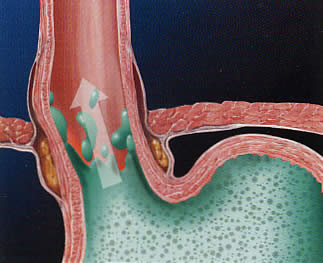

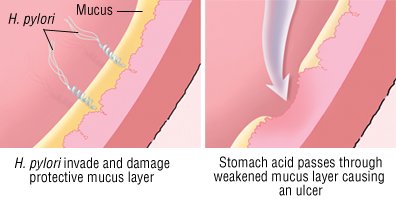
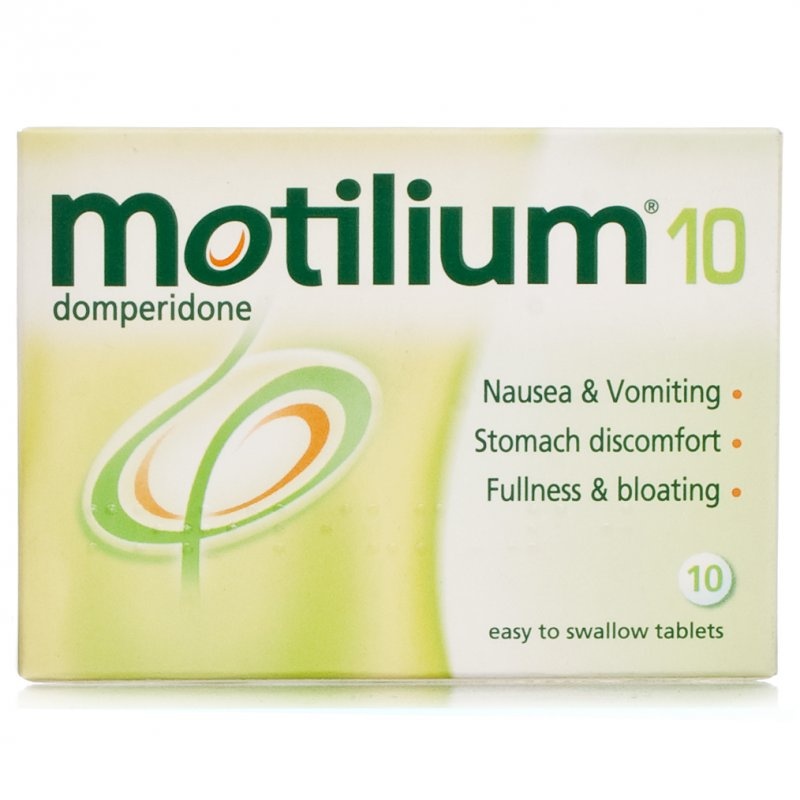
No comments:
Post a Comment